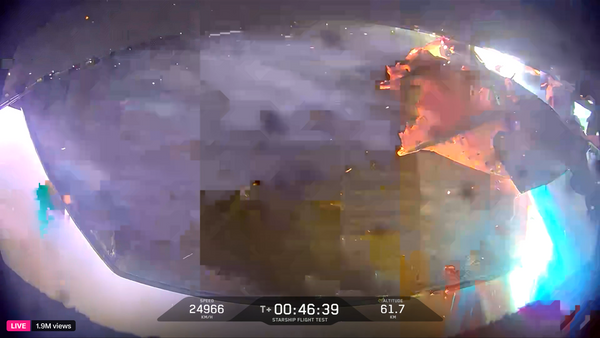SpaceX's Starlink is facing even more competition — this time from retail and tech behemoth Amazon.
On Tuesday, Amazon launched the first 27 of its Project Kuiper satellites into low-Earth orbit, the first step in building out a satellite internet network. When completed, the network will use more than 3,000 satellites worldwide to connect users and communities with limited or no internet access. To connect to the service, customers use an outdoor antenna that communicates with satellites passing overhead.
If all this sounds familiar, that's because it's a largely similar playbook to SpaceX's Starlink. The Elon Musk-owned competitor already has more than 6,750 satellites in orbit and actively provides connectivity to customers.
Amazon's Kuiper As A Starlink Alternative
But Elon Musk's clear connection to Starlink is beginning to shift from a benefit to a liability, one investor says. "As Elon Musk has become closer with President Trump, we've seen certain countries become less willing to want to work with SpaceX or Starlink," Andrew Chanin, CEO of ProcureAM, told Investor's Business Daily's "Investing with IBD" podcast. Procure manages the Procure Space ETF, which trades under the ticker UFO.
Tesla stock in particular has taken significant damage following Musk's foray into politics. In April, the electric automaker reported a dismal first quarter and saw sales tumble in Europe, with analysts citing brand damage as a key reason.
Chanin says this turmoil is creating an opportunity for Amazon. "In many cases, you want the best product you can get available at the best price," he said.
The e-commerce giant also could reap benefits from an in-house, satellite-based internet infrastructure, like streamlining logistics through better package tracking and helping supplement its Amazon Web Services cloud computing offerings.
Chanin says Amazon could eventually profit off a toehold in space communications, even if the use case is not immediately obvious. Amazon has experience in building infrastructure first and figuring out how it makes revenue later, most notably through AWS.
Its cloud computing division began after Amazon took its existing, internally used IT infrastructure and marketed it. AWS eventually became a core infrastructure provider used by governments and blue-chip companies, and now contributes $29.27 billion in revenue according to its Q1 earnings report.
"There's so many things that Amazon does where having space access could be really important," said Chanin.
Audio Version Of Podcast
Kuiper's Reliance On SpaceX Becomes Starlink's Advantage
But creating a satellite network faces one key bottleneck: getting satellites into orbit.
Amazon's reliance on launch partners could slow down Amazon's Project Kuiper and extend SpaceX's dominance. "If you're going to have a system that's relying on space, one thing that you're going to need is launch," said Chanin.
While both Amazon and the space launch company Blue Origin were both founded by Jeff Bezos, Chanin says Amazon did not contract exclusively with Blue Origin for launches because its rockets aren't "necessarily ready to be doing all these launches for them."
He says Amazon has hired multiple companies to provide launches, including Starlink's owner, SpaceX.
Starlink holds a key advantage by having access by default to SpaceX launches, the same service relied on by other competing networks like Amazon's Project Kuiper and AST SpaceMobile. While experts say it is unlikely SpaceX will favor its own launches over competitors, having such capabilities in-house reduces friction.
"That could provide an opportunity, but could also provide a supply crunch for other entities that need to send things into space," said Chanin.
Follow Mike Juang on X at @mikejuangnews and on Threads at @namedvillage.







